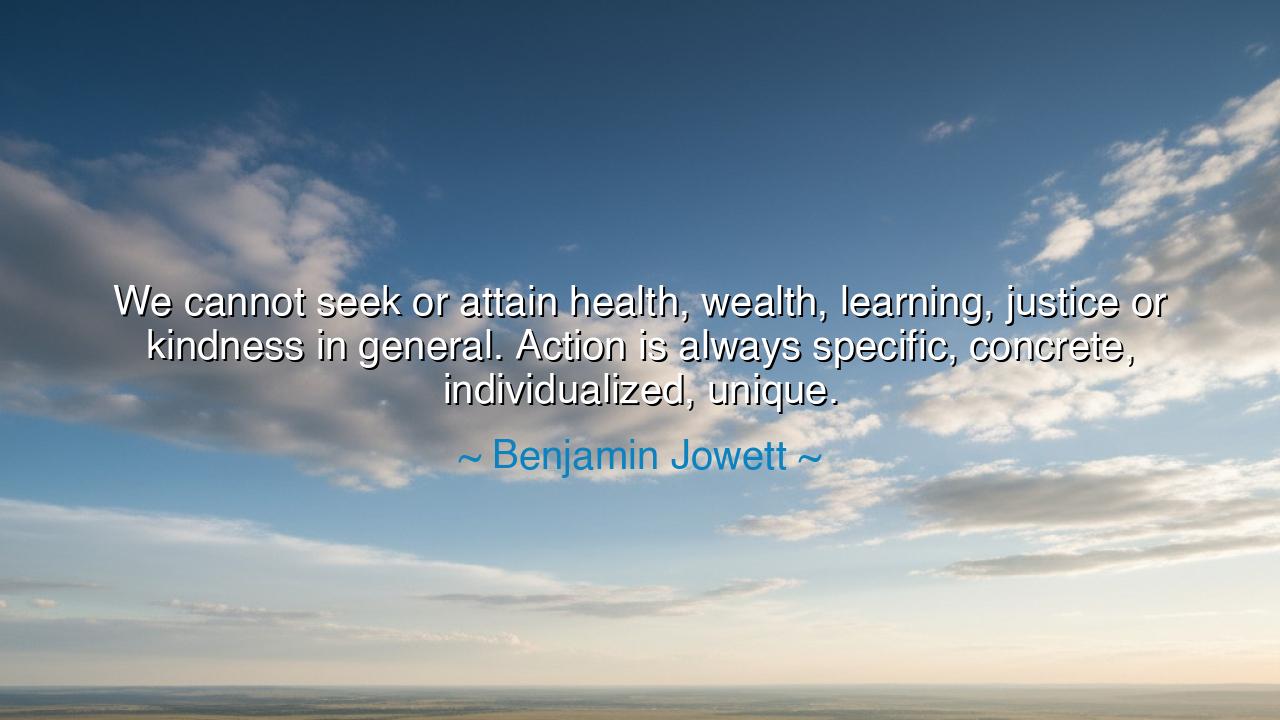
We cannot seek or attain health, wealth, learning, justice or
We cannot seek or attain health, wealth, learning, justice or kindness in general. Action is always specific, concrete, individualized, unique.






In the thoughtful words of Benjamin Jowett, the wise scholar of Oxford and translator of Plato, we find a truth that gleams like a blade honed by time: “We cannot seek or attain health, wealth, learning, justice, or kindness in general. Action is always specific, concrete, individualized, unique.” These words, though spoken by a man of intellect, are not confined to the realm of philosophy — they are a guide to the living of life itself. Jowett reminds us that ideals alone do not shape the world; it is action, precise and personal, that gives them form.
In every age, men have spoken grandly of virtue, justice, and goodness, but too few have understood that such things cannot exist as vague abstractions. One does not love “humanity” in the abstract; one loves a person. One does not practice justice as a concept; one acts justly toward a neighbor, a friend, a stranger. Likewise, health is not a dream or a slogan — it is the daily choice to move, to rest, to nourish, to heal. Wealth is not a wish — it is the labor of hands and the discipline of mind. In these words, Jowett calls us to awaken from the haze of ideals and to anchor our virtues in deeds, for all greatness begins with something small and real.
The ancients, too, understood this truth. When the philosopher Aristotle wrote of virtue, he spoke not of thought but of habit — that a man becomes courageous by doing brave things, becomes just by acting justly, becomes wise by thinking carefully and acting accordingly. To Jowett, a student of Plato, this lesson was a living inheritance. The ideals of philosophy, he knew, mean nothing without specific action to embody them. The seed of goodness must be planted in the soil of the everyday — in choices, gestures, and moments that may seem small but are in fact divine in their consequence.
Consider the example of Florence Nightingale, who in the midst of war and chaos did not speak merely of “compassion” or “justice,” but bent her knees and tended to the wounded one by one. She did not heal “mankind”; she healed men. Her lantern’s light was not a metaphor but a flame that illuminated real suffering and real love. Through her specific actions, she transformed the world of medicine and birthed the nursing profession — proof that when kindness takes form in the concrete, it becomes eternal.
Jowett’s wisdom stands also as a warning. In our time, as in his, many are content to speak of ideals but slow to live them. We say we care for justice, yet turn away from the small injustices before us. We claim to value learning, yet neglect the daily discipline of reading, reflection, and growth. We dream of wealth and health, yet fail to act in the simple, consistent ways that bring them forth. The truth, as Jowett declares, is that there can be no virtue in the abstract. The world is not changed by words or wishes, but by hands that move, hearts that act, and minds that choose.
Every action, he tells us, is individualized and unique — meaning that it belongs to the moment, to the person, to the circumstance. There are no universal formulas for goodness or success. Each man and woman must find their own way to embody truth. What is kindness to one may be justice to another; what is learning to one may be wisdom to another. The beauty of life is that virtue is not a distant ideal, but a living, breathing act — one that must be renewed each day, anew, in the here and now.
So let this teaching be passed down as a flame of understanding: Do not speak endlessly of what is good — do what is good. Do not wait for the perfect plan — begin the imperfect act. If you would have health, care for your body today. If you would gain learning, study today. If you would see justice, defend someone today. For as Jowett reminds us, the ladder of virtue is climbed not with dreams, but with specific steps.
And when you act — when your thoughts take form in the world — you join the lineage of those who turned ideals into destiny. Remember always: the gods of virtue favor not the dreamers, but the doers. Therefore, live not in the clouds of intention, but upon the solid ground of action. For it is only through the concrete and the specific that the eternal may enter time — and through your hands, the unseen ideals of health, justice, learning, and kindness may find their home upon the earth.






AAdministratorAdministrator
Welcome, honored guests. Please leave a comment, we will respond soon